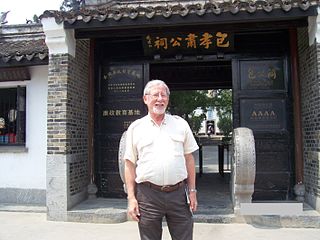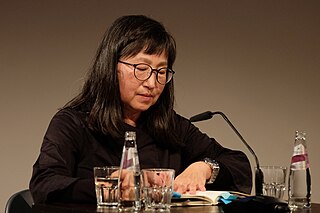
Burton Dewitt Watson was an American sinologist, translator, and writer known for his English translations of Chinese and Japanese literature. Watson's translations received many awards, including the Gold Medal Award of the Translation Center at Columbia University in 1979, the PEN Translation Prize in 1982 for his translation with Hiroaki Sato of From the Country of Eight Islands: An Anthology of Japanese Poetry, and again in 1995 for Selected Poems of Su Tung-p'o. In 2015, at age 88, Watson was awarded the PEN/Ralph Manheim Medal for Translation for his long and prolific translation career.
The American Literary Translators Association (ALTA) is an organization in the United States dedicated to literary translation. ALTA promotes literary translation through its annual ALTA conference and year-round events structured around the creation of high-quality art. ALTA also administers awards to recognize excellence in translation and provides fellowships and mentorships to support emerging translators.

Ko Un is a South Korean poet whose works have been translated and published in more than fifteen countries. He had been imprisoned many times due to his role in the campaign for Korean democracy and was later mentioned in Korea as one of the front runners for the Nobel Prize in Literature.
Lucien Stryk was an American poet, translator of Buddhist literature and Zen poetry, and former English professor at Northern Illinois University (NIU).
Bill Porter is an American author who translates under the pen-name Red Pine. He is a translator of Chinese texts, primarily Taoist and Buddhist, including poetry and sūtras. In 2018, he won the American Academy of Arts & Letters Thornton Wilder Prize for translation.
The PEN Award for Poetry in Translation is given by PEN America to honor a poetry translation published in the preceding year. The award should not be confused with the PEN Translation Prize. The award is one of many PEN awards sponsored by International PEN in over 145 PEN centers around the world. The PEN American Center awards have been characterized as being among the "major" American literary prizes. The award was called one of "the most prominent translation awards."
The National Translation Award is awarded annually by the American Literary Translators Association for literary translators who have made an outstanding contribution to literature in English by masterfully recreating the artistic force of a book of consummate quality. Since 2015 the prize has been awarded separately in categories of prose and poetry. Established in 1998, the NTA is the only prize for a work of literary translation into English to include a full evaluation of the source language text. As of 2023 the award is worth $4,000 given to the translator. The award is usually given to translations of previously untranslated contemporary works or first-time translations of older works, but important re-translations have also been honored. The winning translators and books are featured at the annual conference of the American Literary Translators Association.
Chicago Review is a literary magazine founded in 1946 and published quarterly in the Humanities Division at the University of Chicago. The magazine features contemporary poetry, fiction, and criticism, often publishing works in translation and special features in double issues.
Wei Yingwu , courtesy name Yibo (義博), art name Xizhai (西齋), was a Chinese poet of the Tang dynasty. Twelve of Wei Yingwu's poems were included in the influential Three Hundred Tang Poems anthology. He was also known by his honorific name Wei Suzhou (韋蘇州), which was bestowed upon him as a result of his service as the governor of Suzhou.
Nationality words link to articles with information on the nation's poetry or literature.
Shinkichi Takahashi was a Japanese poet. He was one of the pioneers of Dadaism in Japan. According to Makoto Ueda, he is also the only major Zen poet of modern Japanese literature.

Jonathan Chaves, B.A. Brooklyn College, 1965; M.A. Columbia University, 1966; PhD Columbia University, 1971, is Professor of Chinese Language and Literature at The George Washington University in Washington, D.C. He is a translator of classic Chinese poetry.
Eleanor Goodman is an American poet, writer, and translator of Chinese. Her 2014 translation of the poems of Wang Xiaoni, Something Crosses My Mind was an international finalist for the Griffin Poetry Prize and a winner of the Lucien Stryk American Literary Translators Association Prize for excellence in translation.

Don Mee Choi is a Korean-American poet and translator.

Tal Nitzán is an Israeli poet, writer, translator and editor.
Richard Dixon is an English translator of Italian literature. He translated the last works of Umberto Eco, including his novels The Prague Cemetery, shortlisted for the Independent Foreign Fiction Prize 2012, and Numero Zero, commended by the judges of the John Florio Prize, 2016. He has also translated works by Giacomo Leopardi, Roberto Calasso and Antonio Moresco.

Kim Yi-deum is a South Korean poet and university lecturer.
Kaya Press is an independent non-profit publisher of writers of the Asian and Pacific Islander diaspora. Founded in 1994 by the postmodern Korean writer Soo Kyung Kim, Kaya Press is currently housed in the Department of American Studies and Ethnicity at the University of Southern California.
Ye Chun is a Chinese American writer and literary translator. Her book of poetry, Lantern Puzzle, won the 2011 Berkshire Prize. She received an NEA fellowship in 2015 and a Pushcart Prize for her poem "The Luoyang Poem" in 2017, a second Pushcart Prize in 2018 for her story, "Milk,", and a third in 2020 for her story, "Hao." Her collection of stories, Hao, was published by Catapult in 2021 and was longlisted for 2022 Andrew Carnegie Medals for Excellence in fiction. It was named a Lithub's favorite book of the year, a New York Public Library's best book of 2021, and Electric Lit's Favorite Short Story Collection of the year. Her debut novel in English, Straw Dogs of the Universe, was published by Catapult in 2023 and longlisted for 2024 Andrew Carnegie Medals for Excellence in fiction and named a Washington Post's notable work of the year.





